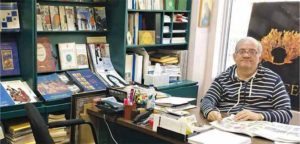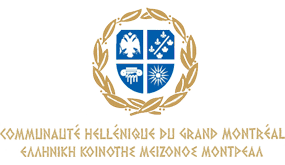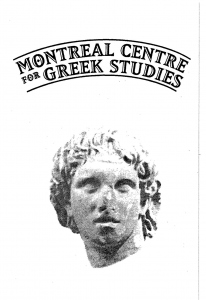ABOUT THE CENTRE
The Montreal Centre for Greek Studies, established in 1983 to offer college and university level courses in English, French and Greek, provides an exposure to Greek cultural values for the general public. The Centre is also dedicated to enriching the education of Hellenic Canadians whose first language is either English or French and who wish to learn more about their cultural heritage.
The Montreal Centre for Greek Studies emphasises the dissemination of that particular world-view which found its most authentic expression in what is now the Greek mainland and in Asia Minor and the very near East. For centuries these areas nurtured several eastern traditions that found their way to the West, passing through the filter of what is today known as Greek philosophy, mythology, and theology.
In the summer of 1983, a group of young professionals in Montreal, mainly with Greek backgrounds, met to lay the groundwork for a program of studies that would initially provide a means for Canadians of Greek parentage to gain a greater understanding of their language and heritage, but also as a means to provide a venue where they, and those outside the immediate Greek community, could explore more deeply the manifold aspects of the Hellenic culture. In the more than 28 years since then, the Montreal Centre for Greek Studies has succeeded well beyond its founders hopes, developing into a major outreach of the Hellenic Community of Greater Montreal to the whole of the Montreal area.
OBJECTIVES
1. To preserve, advance, and disseminate the Greek cultural heritage: language, traditions, arts and letters.
2. To offer an on-going series of college and university level courses in six areas: a) Language, b) History, c) Religion,d) Literature and Humanities, e) Folk culture and popular traditions, f) Special Topics, Seminars and Conferences.
3. To promote activities which will help participants of various backgrounds to discover the origins of western traditions.
4. To prepare and encourage Greek-Canadian youth to share their cultural inheritance with fellow citizens from different backgrounds, thereby enhancing intercultural relations within the wider Canadian society.

Director:
Dr. John Hadjinicolaou, University Professor
2023 Winter Semester
All levels will be available with the same scheduled choices of days and times to start with as if you were in classrooms but not ruling out the possibility of changes in time or day if there are enough requests. Classroom attendance might be possible depending on the Access to rooms and group choices.
Please indicate your choice of Level and possible days/evenings available.
2023 Winter Semester
Greek Language Courses
Beginners A-1
Beginners are asked to choose one of the following 3 with an additional back-up day:
Monday 18h30-21h
Wednesday 18h30-21h
Saturday 9:30-12pm
Other courses available are as follows:
Beginners A-2
Beginners A-3
Conversation A-4
Intermediate A-5 -7
Advanced A-9+
Summer courses for Greek language start the first week of May
Fall courses start the first week of October
Winter courses start the first week of February
Once (1x) a week for 10 weeks or 25 hours
Price $300
Textbooks $20
Workbooks $20
Registration – on or before January 20, 2023
| Placement tests by appointment; online with the Director, Dr. John Hadjinicolaou at: 514-738-4018 or: [email protected] | ||||
| Location: 5777 Wilderton Ave | Contact: | Lesley-Ann Judge | ||
| Suite 105
Montreal, Qc H3S 2V7 |
[email protected]
Cell 514-234-3794 |
|||
COURSE DESCRIPTIONS
SECTION A: Language: Modern Greek, New Testament Greek and Ancient Greek
A-0. Modern Greek for Greek-Canadians I
This course is for those Greek-Canadians of second and third generation who learn to speak Greek at home but who do not read or write Greek. This course provides the opportunity to learn how to read and write and to continue in the advanced levels of the Modern Greek language program.
A-1. Beginners’ Modern Greek I
This course allows those who have little or no knowledge of Greek to understand the structure and fundamentals of contemporary Greek. Beginning with oral drill, students move on to develop basic writing skills.
A-2. Beginners’ Modern Greek II
This course is for those who have completed A-1 or who know basic Greek: the alphabet and grammatical rules. Practice is based on written and oral communication, with short assignments that reinforce the student’s skills.
A-3. Beginners’ Modern Greek III
With this course students develop their understanding of the spoken and written aspects of the language. They are introduced to Modern Greek culture by learning contemporary idioms.
A-4. Conversational Greek
This is a flexible course for those who know Modern Greek in its written form – vocabulary, alphabet, grammar – but who have problems with oral use of the language. It strengthens their pronunciation skills by working on oral presentations and assignments inside the classroom. Additionally, the course clarifies obscure points and enriches the vocabulary.
A-5. Intermediate Modern Greek I
A-6. Intermediate Modern Greek II
A-7. Intermediate Modern Greek III
These courses are designed for those who wish to improve their oral and written skills in Modern Greek.
A-8. Advanced Modern Greek I
A-9. Advanced Modern Greek II
A-10. Advanced Modern Greek III
The purpose of these courses is to perfect oral, written and translation skills in Modern Greek.
A-11. “Koine” – New Testament Greek
This course is designed for those who would like to learn New Testament Greek, or “Koine”, using the original New Testament text and some simple Patristic texts. A gradual familiarisation with Koine grammar leads to a deeper understanding of its structure and fundamentals, for both those who are familiar with Modern Greek and those who are not.
A-12. Ancient Greek for Beginners
This is an introductory course in Ancient Greek (5th century BC.). In addition to securing a command of reading, emphasis given to the structure and fundamentals of the language, using simple excerpts from renowned authors.
SECTION B: History
B-1. History of Ancient Greek Literature
This course presents a general view of ancient Greek literature – its birth, evolution and significant milestones – in relationship with the socio-cultural environment of the classical era. The content of the course is divided into units according to subject and chronological order. Starting with fundamental literary questions, it defines the role of these works in ancient Greek society and traces the evolution of ideas through significant literary works of each era. Each two hour session provides students with material and information of specific topics. Discussions are also included.
B-2. Byzantine Civilisation
This course coves the most important periods of Byzantine history (330-1453): the principle of Byzantine theocracy, the Hellenistic heritage of Byzantium, the ecclesiastical organisation, the organisation of the army, diplomacy, foreign policy, the demography of the empire and Byzantine literature and art.
SECTION C: Religion
C-1. The Faith We Hold
This course is given in six weekly 2-hour sessions per semester. Each session is divided into two parts. The first part is dedicated to the study of one of the books of the New Testament (a chapter or two per week) discussing it in light of the Orthodox Tradition. In the second part, guest speakers deal with special topics covering a broad spectrum of contemporary Orthodox issues, church history and the lives of saints.
C-2. The Art of the Icon (Orthodox Iconography)
Iconography as an “art form” has become popular in the West. This course examines the art and meaning behind traditional Orthodox icons. Topics covered include: the historical development of Christian images, iconoclasm, difference between Western and Eastern Christian art forms, and the major Greek iconographic “schools” of Crete, Macedonia, Novgorod, Wallachia, Moldavia, Georgia and others. Romanesque and Coptic forms of painting, as well as other historical forms, are also studied.
SECTION D: Literature and Humanities
D-1. Ancient Greek Theatre
This course is an introduction to ancient Greek theatre. It acquaints students with the socio-cultural roots of its birth, its technical details, and the most significant theatrical works of the Greek classical era.
The course begins with the role of religion in ancient theatre (feasts of Dionysus etc.), continues with a description of its competitiveness and the principal elements of its content (actors, chorus, etc.). A quick reference to the history of its development precedes the discussion of the important works of the most famous masters.
D-2. In the Spirit of Socrates
This course is designed to help the student appreciate the splendour of the ancient philosophical thought introduced by Socrates and Plato. Proceeding by the same dialectical approach as Socrates, the instructor guides students in an interactional exploration of the same issues, commenting on their significance and that of the Socratic Method for the modern world.
Of primary importance is the presentation of Plato in a way that respects his subtlety and genius and bypasses the facile caricatures by which he is so often portrayed. Special attention is given also to those aspects of Platonic philosophy that appear either enigmatic or not obvious to modern readers because the world is viewed differently today. This is precisely where most interpretation of Plato goes astray.
SECTION E: Folk Culture and Popular Traditions
E-1. Archeological Sites in Greece
This course brings students into contact with the artifacts of Greek civilisation in present day Greece. We study the most representative archeological and historical sites, such as those of Olympia, Athens, Delphi, Epidauros, Vergina, Mykinai, Knossos etc. As well, we study works of art and monuments, with respect to their form, style, technique and symbolism. We examine the different types of art such as architecture, painting, ceramics, jewelry, mosaics and sculpture, from the beginning of Greek art until the Roman era. The course is illustrated by transparencies.
E-2. Introduction to Greek Mythology
This course acquaints the student with the fundamentals of Greek Mythology through the study and assessment of various myths. In particular, the course focuses on the age old questions of the creation of the world, the role and scope of Deity and the human condition. We also examine the social and political context in which the myths arose and attempt to evaluate the origins of our cultural inheritance as formulated by reason, imagination and passion.
E-3. Vacation in Greece
The course is for those planning a vacation in Greece. It is also for those who want an introduction to Greek popular music and customs, theatre, museums, archeology and ancient and Byzantine history.
SECTION F: Special Topics
F-1. Dance for your Life!
With a minimum of six workshops on dancing as Greeks actually do, this course is for both beginners and those who wish to un-learn structured styles. Special attention is given to free and natural movement and self-sufficiency, especially in mainland and island “Syrtos”, the components of an organic and flexible “Tsamikos”, as well as “Hassaposervikos”, the basics of a classic “Slow Hassapikos”, and an emphasis on turns and variations in “Kalamatianos”. This is not a folk or regional dance course. The aim is to prepare you to integrate into baptism, wedding and name-day celebrations amongst Greeks without calling undue attention to awkwardness or trendy choreography.
F-2. Mediterranean and Greek Cuisine
This course teaches the preparation of an assortment of dishes from entrees and hors d’œuvres to meat and fish dishes and pastry. The course is in 6 sessions. The first three theoretical lessons familiarise students with the history of Greek cooking and its significance as a form of folk art. Students learn the methods of cooking, the ingredients and how to combine them in inventive ways to create new dishes. The last three lessons are practical cooking sessions in which students prepare at least 5 main courses, from areas such as Crete, Kastoria, Roumeli and the Peloponnese.
ADMISSIONS
GENERAL INFORMATION
1. The courses for each session begin the first week of October, February or May respectively.
2. A tuition fee of $250 per course will be charged (ten sessions of two and one half hours each).
3. Most courses will be held during week-day evening hours at the Hellenic Community Centre Adrian Maris, 5777 Wilderton Avenue, Montreal, Quebec H3S 2V7.
4. Placement tests in the language section will be held upon request for those who need them.
5. Should a conflict of time or day arise, we shall attempt to accommodate the maximum number of persons.
For further information call:
514-738-2421 extension 122.
John Hadjinicolaou514-738-4018 or
Lesley-Ann Judge514-234-3794, [email protected] or [email protected]






